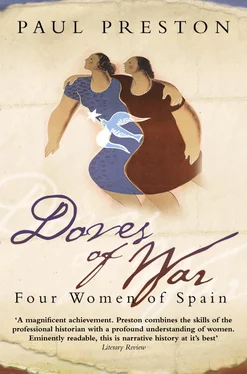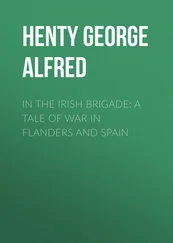1 ...6 7 8 10 11 12 ...27 Sad to leave Touffles, she continued her journey on 28 September, moving on to Burgos where she toured the great cathedral, then onto Valladolid and to Salamanca. Pip was entranced by Spain, the only drawback being the fleas awaiting her in every hotel bedroom. She and Princess Bea stayed with General Kindelán. Kindelán was a man of great rectitude and austerity. Nevertheless, to Pip’s young eyes, oblivious to his moral and political merits, he was just ‘rather fat and sloppy’. At the Grand Hotel in Salamanca, she caught a glimpse of the ‘stunning looking’ Peter Kemp, whom she knew vaguely from London. In a Carlist regiment, he was one of the very few English volunteers on the Nationalist side. On 1 October, the first anniversary of Franco’s elevation to the headship of state saw a major display of pageantry. Pip was elated by being able to witness history being made – ‘a parade of soldiers led by the Moors in their wonderful coloured cloaks on Arab horses with golden trappings. The leaders rode white Arabs with silver hooves and gold-embroidered medieval trappings which looked beautiful with the men’s white and orange cloaks, behind them were men in green cloaks on black horses got up the same but with golden hooves.’ Her concern that the Nationalist forces might be antiquated was redressed when Álvaro, Princess Bea’s eldest son, took her to inspect the Italian Savoia Marchetti tri-motored bombers at his air base. This was the Base Aéreo de Matacán, built in October-November 1936. Afterwards Álvaro took her to see the fierce fighting bulls at the estate of Antonio Pérez Tabernero, a bull-breeder friend of the Kindelán family. 57
On 2 October, she was thrilled when Touffles unexpectedly showed up in Salamanca although her delight was tempered when he spent their brief time together teasing her about her figure. She also wrote to her father and asked him to buy her a Ford 10 and have it sent to Gibraltar. ‘I hope you do as I must have a car if I am here alone.’ On 4 October, they left Salamanca and, after a spectacular journey south through the harsh and arid hills of Extremadura, they reached Sanlúcar de Barrameda – the family’s Palacio de Montpensier having been returned to Prince Alfonso by Franco. Pip found its crazy mixture of styles hideously ugly but fascinating. Prince Ali, now a lieutenant colonel in the Nationalist airforce, was stationed at Seville and so was often able to visit his home. Inevitably, she imbibed the family’s views on the Reds. 58
By mid-October, everything had been arranged for her to go and stay with the Duquesa de Montemar in Jérez while attending a nursing course at a hospital there. Lord Howard de Walden cabled that her car would be sent to Gibraltar in a few days. When it arrived at the end of the month, she thought it ‘heaven. Black with green leather inside and a dream of beauty.’ At first she found the hospital ‘splendid fun’ and ‘not in the least disgusting’. The bulk of the patients were Moorish mercenaries whom she found ‘perfectly sweet but like a lot of children and rather dirty’. When her course proper began, she was shocked by the appalling wounds that had to be treated. ‘I did not feel sick at all but afterwards when I left the hospital I kept seeing the wounds all day and hearing the screams of agony.’ She was fully aware that she would see far worse sights at the front. ‘I understand now why nurses are so often hard and inhuman.’ While in Jérez, she got gathered up in the local social whirl. She was mortified when it was suggested to her by her hostess, the Duquesa, among others, that it was obvious that she was in love with Ataúlfo and ought to marry him. This was not because the idea displeased her. Quite the contrary, but she was embarrassed that her infatuation should be so obvious. Despite her emotional preoccupations, she made good progress with her nursing skills. She loved the work and was beginning to be able to witness without distress the most hair-raising wounds being treated. 59
There were now two parallel strands in her life. One was training to be a nurse at the front and the other was her deepening passion for Touffles. When he returned to Sanlúcar and telephoned to invite her over, she skipped her classes to go and see him, ‘hopping with life and merriment’. When she got back to the Orléans household, her happiness knew no bounds. The life of the well-to-do in the Nationalist zone had no equivalent in the Republican ranks. Touffles arrived with nine Luftwaffe pilots for a bout of entertainment and relaxation that included swimming, a flamenco fiesta at one of the Jérez bodegas and a visit to a stud farm for Arab steeds. There was then a trip to Gibraltar to collect Pip’s car and to do shopping, during which she bought a white kimono embroidered with golden dragons. She spent a lot of time with Touffles drinking and dancing. After one late night, she wrote: ‘I adore Touffles more every day and only wish I could just stay with him for ever.’ He bought her a radio in anticipation of her imminent twenty-first birthday. It was to accompany her throughout the Spanish Civil War. Loaded with shopping, including 3,000 cigarettes, she drove her new car back into Spain. Her social position ensured that she had no difficulty getting through the border control. ‘They had been warned to expect us and refused to let us declare anything. So we just sailed through with no trouble at all. It was very nice of them to be so kind as it saved a packet of trouble as my car has no triptyque [a document permitting the transit of a car from one country to another] or insurance, and I have no licence.’
Ecstatically happy to be spending time with Touffles, she had no desire to return to the hospital at Jérez. However, her views were somewhat altered when she came face to face with the arrogantly sexist mentality of the Andalusian aristocratic señorito. Pip and the family went to Seville to stay at the Hotel Cristina, which was ‘crammed full of Germans on leave’. Touffles met up with his Luftwaffe comrades and announced that they were off to a brothel. ‘Of course it is damn stupid of me to mind as it won’t be the first or last time he sleeps with a tart but if he liked me the weeniest bit the way I want him to, he could not have told me he was going to without a qualm. However, who cares. I’m damned if I’m going to. I knew he was not in the least in love with me before so it does not make any difference. Oh hell and damn.’ When he and his German cronies did the same on the following night, she decided that she would rather be at the front nursing. She did not know, of course, whether he did anything more than play the piano and dance. 60
Feeling rejected by Ataúlfo, she began to get involved in her hospital work. On 10 November, she attended her first operations which she found enthralling. Touffles went back to his unit on the next day, leaving her ‘with that grim feeling of emptiness and the awful wartime pessimism of wondering at the back of my mind whether I will ever see him again’. One and all continued to enquire as to when she would marry him. She wrote in her diary: ‘But why bother, at this very moment he is almost certainly tootling around Seville with a tart but why should I care. Of course I do but it is very stupid.’ She was finding some consolation in nursing. She loved the work although ‘I am beginning to loathe the Moors. They are so tiresome always quarrelling and yelling at one. It makes me mad to have a lot of filthy smelly Moors ordering me about.’ On the eve of her twenty-first birthday, she wrote: ‘I feel awfully small and young tonight. In a new country talking a strange language and only understanding half of what is said to me, doing a new kind of work amongst new people and about to prance off on my own to the middle of the war. Sometimes I feel an awful long way from home but who cares. It is the first adventure I have ever undertaken and so far I love it.’ When Princess Bea returned to England on 20 November, Pip went back to Jérez where she waited anxiously for her nursing examination. She was keen to get to the front – ‘I am tired of waiting around doing nothing much. I want action.’ Every day, her diary recorded her anxiety to be off to war. However, this required the permission of Mercedes Milá, the head of the Nationalist nursing services. The ordeal of the examination on 1 December passed off less traumatically than she had feared. In fact, she was amazed by how much she was left to do in the hospital without supervision. 61
Читать дальше












